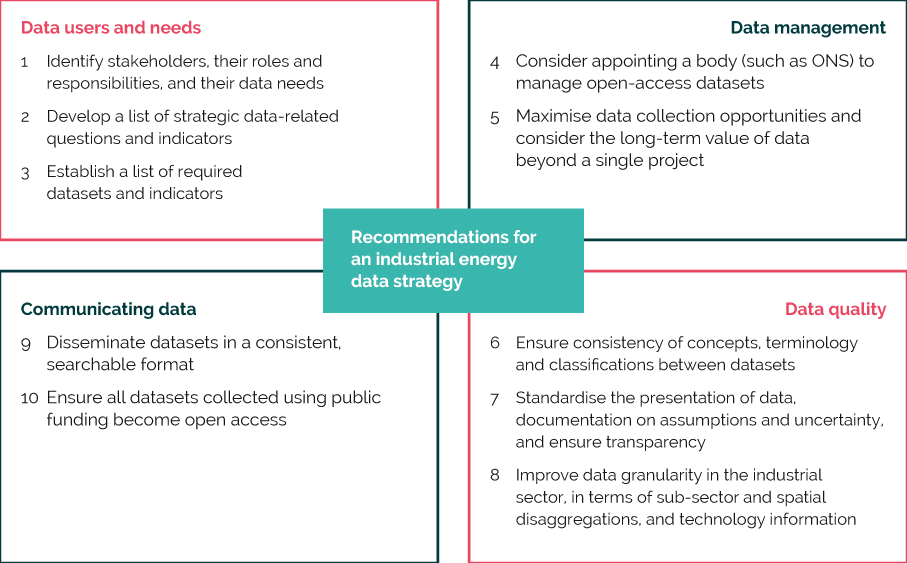New report from CREDS and Aether explores whether the existing data on industrial energy use and emissions can meet the challenges associated with the UK’s ambition to be net zero by 2050.
The UK has committed to reducing greenhouse gas emissions to net zero by 2050. A new report from CREDS and Aether, explores whether the existing data on industrial energy use and emissions can meet the challenges associated with this and proposes an improved data strategy.
The UK no longer has the opportunity to gradually introduce new technologies and allow for the moderate uptake of low carbon options. Instead, the UK Government acknowledges it needs to take an active role in driving innovation and correcting market failures. Such an approach requires robust evidence to ensure that environmental, social and economic goals are met. Good quality data is vital to implement this transformation and inform credible decision-making.
The joint CREDS and Aether report, published in March 2020, explores whether the existing data on industrial energy use and emissions can meet these new challenges and proposes an improved data strategy.
Existing data concerns
In the full report, the authors found that data are not currently good enough for the demands of providing robust and timely analysis to policymakers. There are serious concerns related to:
- inaccessibility and proprietary ownership limiting the availability of data to users.
- poor transparency in dataset methods, underlying sources and assumptions.
- inconsistency, incompleteness, and incomparability in the use of classifications and taxonomies, units and formats.
- a lack of continuity with irregular updates to datasets.
- poor detail, particularly technological detail, in existing datasets, limiting the quality and scope of representing industrial sub-sectors.
Conclusions
The authors conclude that:
- there is an urgent need for a public data strategy which gathers linked data on emissions, technologies, and related environmental, social and economic impacts.
- high-quality data and indicators for the monitoring and management of industrial energy should respond to the needs, both present and future, of stakeholders.
- this ideal dataset(s) should be readily updatable, open access, and independently managed, while ensuring consistency in concept, terminology and classifications.
- the Department for Business, Energy and Industrial Strategy (BEIS) and the Department for Environment, Food and Rural Affairs (Defra) would be well placed to help establish a central public body that works with key agencies (for example the Office for National Statistics and Committee on Climate Change) with the aim of delivering an improved evidence base on industrial energy, emissions and technologies.
Recommendations
The ten key recommendations for optimising the quality of datasets in any field fall into four categories:
Data users and needs
- Identify stakeholders, their roles and responsibilities, and their data needs.
- Develop a list of strategic data related questions and indicators.
- Establish a list of required datasets and indicators.
Data management
- Appoint a public body (such as the Office for National Statistics) to manage open data access.
- Maximise data collection and consider the long-term value beyond a single project.
Data quality
- Ensure consistency of terminology and classifications between datasets.
- Standardise the presentation of data, documentation on assumptions and uncertainty and ensure transparency.
- Improve data granularity in the industrial sector, in terms of subsector and spatial disaggregation, and technology information.
Communicating data
- Disseminate datasets in a consistent, searchable format.
- Ensure that all datasets collected using public funding become open access.

Barriers and benefits to recommendations
There will be barriers to implementing the proposed recommendations, such as a perceived additional burden, short-term increased costs and industry confidentiality concerns. However, over the longer-term the recommendations will be beneficial to a range of stakeholders.
| Stakeholders | Benefit of recommendation |
|---|---|
| Government analyst (including consultants contracted by government) |
|
| Academic researcher |
|
| Civil society |
|
Reference
Norman, J., Barrett, J., Garvey, A., Taylor, P., Goodwin, J., Gibbs, M., German, R. and Garland, L.. 2020. A data strategy to promote the clean growth of UK industries | Report highlights. Centre for Research into Energy Demand Solutions, Oxford.
Banner photo credit: Shutterstock
